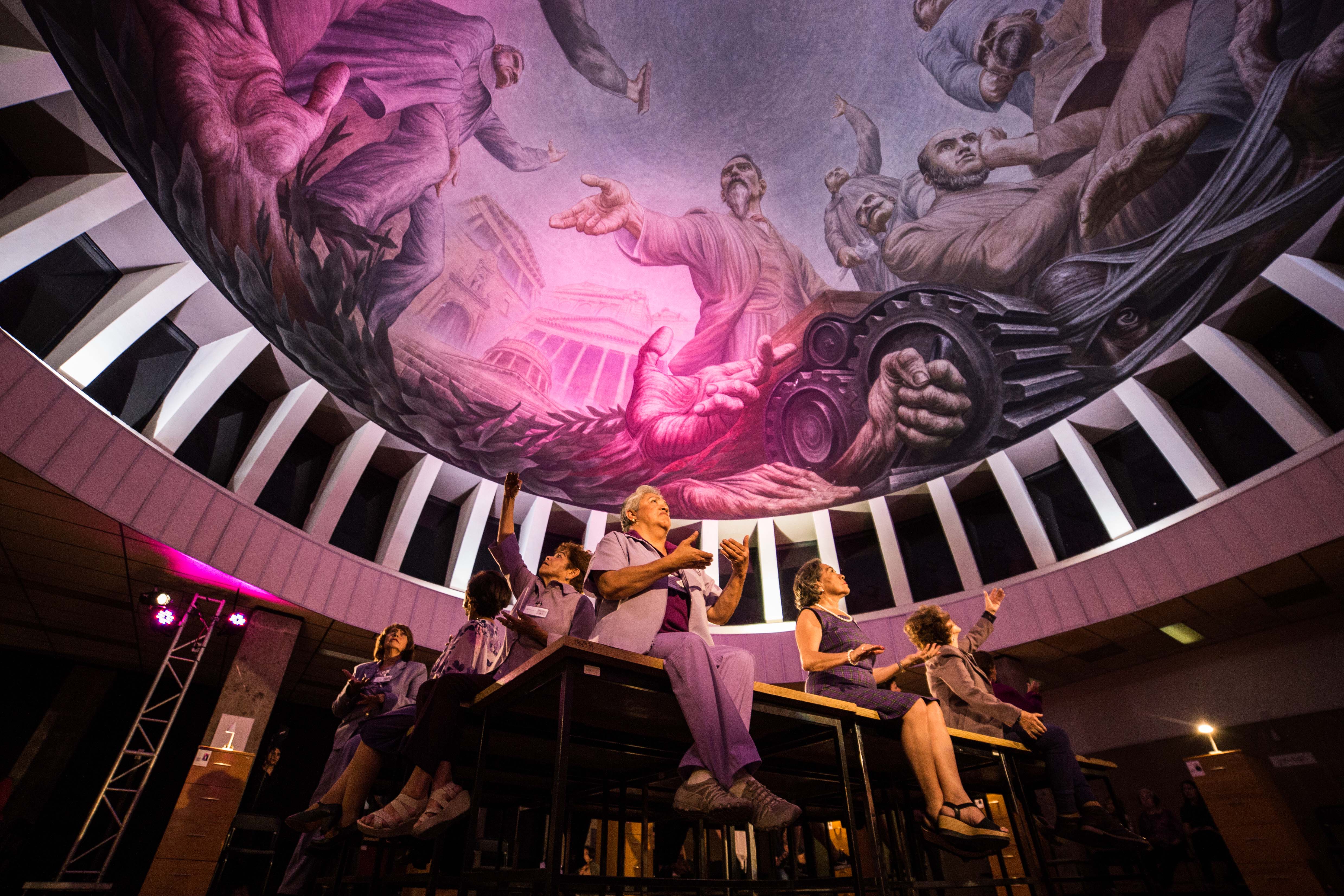How To Fragment Machismo? Augusto Boal and the Rehearsal of Everyday Life
02/02/2023
Fragmenting machismo means co-creating a psychodiversity and a diversity of ways of expressing masculinities from the point of view of a relational and processual poetics [...] this essay is a first approach to the implementation of such fragmentation through the dramatic-pedagogical tools of the Brazilian playwright Augusto Boal.
“[…] the I-now observes the I-before and enunciates an I-possible, an I-future.”
“Performance art […] shoves our noses up against the genesis of being and forms, before they get a foothold in dominant redundancies—of styles, schools and traditions of modernity.”
Fragmentation
In an essay entitled Fragmentar el machismo: ¡Todos los hombres podemos ser diferentes! [Fragmenting Machismo: All Men Can Be Different!] I argued that the apparent essence or “naturality” of machismo in masculine expression is the result of a hylemorphic-identitarian presupposition and imposition in the processes of subjectivation, which precede the political consciousness of the subjects. In other words, machismo can be understood as a matrix or relational mold that pre-exists and exceeds the particularity of individual experience and through which a way of acting and expressing gender is imposed on us. Given the stubborn prevalence of this condition and its consequences, I borrowed the concept of 'fragmentation' from the Chinese philosopher Yuk Hui, to resituate it in a micropolitical praxis: fragmenting machismo means co-creating a psychodiversity and a diversity of ways of expressing masculinities from the point of view of a relational and processual poetics.[1] To achieve this, it is necessary to research and put into practice pedagogical, artistic and critical approaches capable of generating what Félix Guattari called 'collective resingularization.'[2]
Based on the above, this essay is a first approach to the implementation of such fragmentation through the dramatic-pedagogical tools that the Brazilian playwright Augusto Boal left behind. His 'poetics of the oppressed' operates transversally between art, pedagogy, therapy and everyday life to found vital practices for critical experimentation with our modes of relationship.
I grant that it may be controversial to use tools created for the liberation of oppressed subjects in the service of a group that is in many cases "the oppressor" par excellence. Even so, when we consider machismo as a relational phenomenon that exceeds and pre-exists the subjects, the Theater of the Oppressed (TO), and in particular the forum-theater, are productive tools to show those who are part of its cast, not only the oppressions in their attitudes, but also tangible alternatives in their ways of relating and, of particular importance, how these can be put into practice.
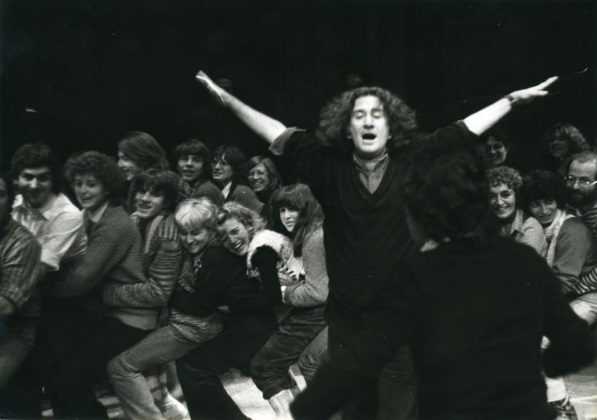
This is precisely what Boal offered for the processes of diversification of masculinities: a praxis [3] founded on the materiality of experience that operates beyond politics of guilt allowing us to rehearse daily life, to situate ourselves as agents-students capable of knowing and modulating our inevitable co-involvement in the situations of which we are a part. In Boal's own words "[...] the Theater of the Oppressed is a mirror where we can penetrate, and, if we do not like our image reflected in it, we can transform it, sculpt it anew according to our desires, because the act of transforming is transformative: by transforming it, we transform ourselves! That is our hypothesis!"[4] Let us pursue that same hypothesis.
The Rehearsal of Everyday Life
In his most famous essay Poética del oprimido, Augusto Boal announces on at least three occasions that "[...] theater may not be revolutionary in itself, but it is surely a "rehearsal" for revolution."[5] The phrase suggests that in 1973, the year in which El teatro del oprimido was published, the playwright hoped that his method would be a training or catalyst for a popular revolution. However, and although they were present from the beginning, it was not until El arco iris del deseo (1990), that the author's reflections on the explicitly therapeutic potential that the exercises developed throughout his life could have were put into circulation. "Any therapy [...] must consist of the presentation of various possible alternatives. A procedure is therapeutic when it not only allows the patient to choose alternatives to the situation in which they find themselves and which causes them to suffer, but also when they are stimulated to do so."[6] This is precisely what happens in the forum-theater exercises: the participants, people with the most varied experiences in the most varied contexts, stage a situation from their daily lives in which a problem has arisen that they don't know how to solve. When the critical moment of the event arrives, whoever is present can stop the scene and intervene, replacing one of the actors to try a different action, becoming the protagonist and qualitatively changing the tone and the outcome of the situation.[7] Hence, what Boal called 'metaxis' is generated: the capacity to exist and act in a "fictitious" world (that of the theater) that overflows into a "real" world (the everyday one) by opening more potentials in sensibility and in the capacity to (re)act to its situations.[8]
In the work of Guattari and Gilles Deleuze, the concept of 'singularity' replaces that of 'individuality' as a notion that names the difference between different persons, things or events. Singularity, in contrast to individuality, allows us to think of the difference between things without separating them from the relational milieu of which they are part.[9]
Thus, to speak of singularity situates both subjectivity and the body in a more-than-human way in the complexity of a shared becoming in and with the world. Re-singularization is, then, the vital process through which we reinvent, recalibrate or acquire new ways of relating to the agencies that surround us. Therapeutic! Boal would say. That is the function of forum-theater.
Let's imagine a forum-theater scene among a group of cisgender men and women. Suppose they are working to form healthy, anti-sexist habits in their relationship dynamics. Among the habits they are working on are things like paternalism, the inability to show emotion or vulnerability, and in this instance, jealousy. They already know what oppressions are, but they don't know, in a somatic and experiential way, other ways of acting in the face of these oppressions. A girl (let's call her Ana) stands up and tells a story: a couple of years ago at a party, an ex-partner of hers (then her boyfriend, Carlos) saw her talking and laughing with a male friend. Carlos, clearly jealous and defensive, approached Ana and grabbed her by the waist, turning her around and forcibly kissing her to, as he later told her, "show the other guy who she belonged to". After a while, Ana was chatting with her friend once again when the drunken boyfriend appears and starts hitting the other boy. She screams, the other boy tries to defend himself. In the end some people who were watching the situation separate them and they all go home. The next day, fighting, the boyfriend explains why he hit the boy: "He was looking at you and I knew he wanted you for himself. I got mad and I couldn't control myself, but I did it because I love you."
Everyone in the group discusses the story and identifies the machismo and attitudes that occurred that day: possessiveness, physical violence, insecurity, etc. Several girls tell that they have had similar experiences with friends and partners while some boys admit to having participated in similar violence or felt the same kind of rage. The story is staged, actors are chosen for the roles and the situation is recreated as well as possible. At first, when the moment comes when Carlos is jealous, the viewers suggest ways in which Ana could have acted differently to avoid the situation. But after a few attempts, given the re-victimization implied by focusing on Ana as responsible for the situation, the girls claim that the one who should have changed his attitude was Carlos; the scene adapts and then the critical moment that is rehearsed is the moment before the kiss. A boy shouts "STOP!" and enters the scene to take Carlos' place: he observes Ana with his friend, gets jealous and decides that he is going to go to distract himself and drink with his friends. Everyone discusses and agrees that this doesn't solve anything, because the boy only ends up repressing his emotions and getting drunk increases the possibility of acting irascible. Several attempts later, a girl comes on stage and takes the place of the boyfriend, gets jealous, approaches Ana and the other boy and begins to talk with them in a friendly way, hugs Ana warmly and, after the party, sits down to talk with her about what he felt at that moment. Everyone agrees that this solution is effective except for one boy, who exclaims that when feeling jealous and angry, it is very difficult to act so rationally. This is noted and so they continue, rehearsing the scene until everyone is familiar with the complexities of the experience on both sides.
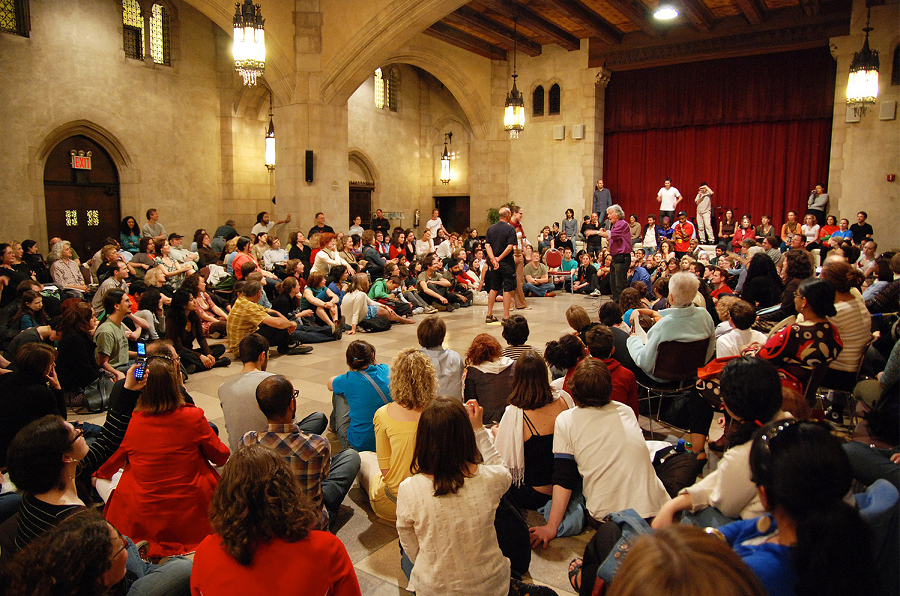
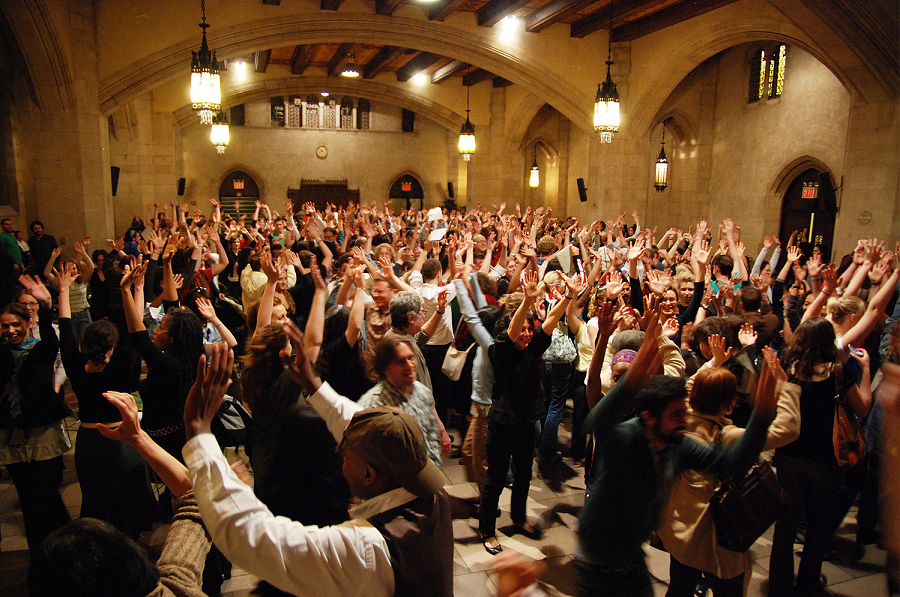
This exercise shows us that by generating a 'metaxis', we can "increase our capacity to understand [...] and offer everyone working tools [...]."[10] Forum-theater grounds in experience enabling fictions, rehearsals through which we can increase both our 'sens-ability' (our ability to sense the nuances of a situation, whether actual or virtual) and our 'respons-ability' (our ability to respond to the world in a situated way in the shared uniqueness of each event)[12] to the potentials present in a situation. It is a way of opening up "diverse alternatives" that reimagine, reframe and thus resingularize both the event and the agents that are part of it.
If the Theater of the Oppressed is a "rehearsal for revolution," it is revolution not in the sense of an organized Marxism that overcomes the existing structure with another emerging structure, but precisely in the sense that Guattari and Deleuze give to the term: the opening of spaces for the promiscuous expression of a life full of dynamism, movement, vitality.[13]
Therefore, the Theater of the Oppressed "shoves our noses" into a world where poetry and ethics coincide, which is why we can call the poetics of the oppressed a 'po-ethics': a practice (or praxis) of consciousness-raising and affirmative action that situates us as agents capable of modulating and creating our modes of relation. This doesn't happen individually, but rather in singular and shared ways: all those present are together but experience the event in different ways.
For a Po-ethics of Masculinities
Many of the methods commonly employed in anti-sexist work groups among men are individualized practices that tend to be purely introspective. Today, one of the most commonly used terms in Latin American contexts is 'deconstruction', which is used (without much reference to the work of Jacques Derrida) to talk about the process of getting to know the kinds of oppression in which we participate and "unlearning" these attitudes. Unfortunately, this process is abstract and limited to the capacity that each person has for themselves, so this supposed deconstruction of our habits and preconceived ideas, remains simply a didactic,[14] moralistic and little informed by the material reality that we share with those who affect us and those we affect.[15]
In contrast, the example above is based on a process not only of learning about existing oppressions, but also seeks to provide real experience of alternative courses of action in the face of those oppressions. This also necessarily requires dialogue and collaboration to occur, which energizes the introspective processes by situating them as part of a relational ethic and collective pedagogy. Thus, the spect-actors [16] not only know what the oppressions are, but learn different potential ways to respond to them. Processes of re-subjectivation cannot only be representational and abstract, they must be situated and experiential processes. Deconstruction by itself is insufficient, since relearning to express masculinity (or any other set of habits) is like learning to ride a bicycle: it is not enough to know how to do it in theory, one must ride in order to be able to do it. Moreover, like riding a mountain bike, every terrain will be different; some unobstructed, some rocky and tricky, and some muddy and slippery. This practice requires that we keep learning constantly in an active, experiential relationship with the accidents and surprises that arise in every situation.
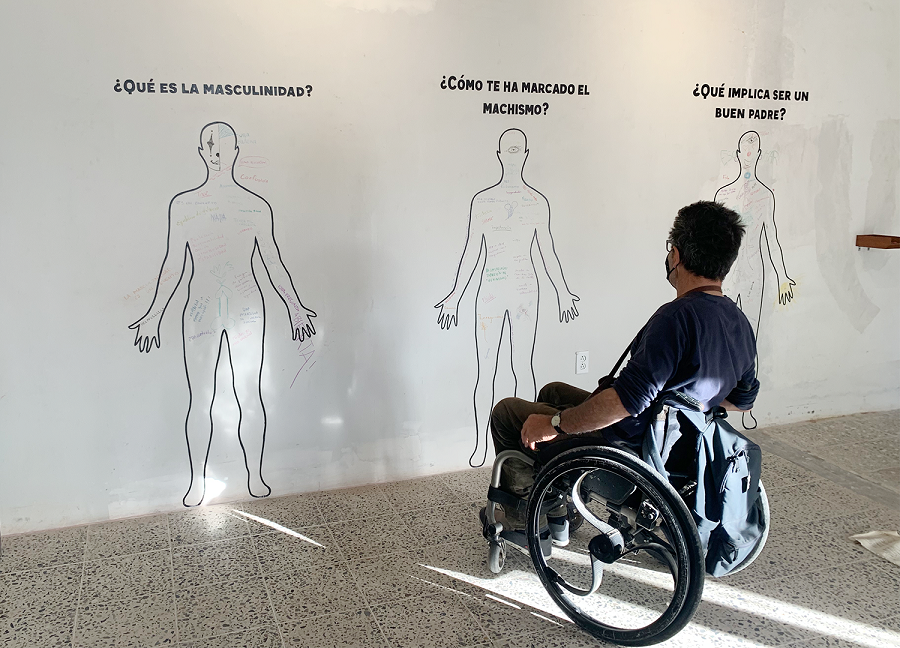

In El arco iris del deseo, Boal reflects on his own prejudices about neurodivergent people in such hospitals.[17] This section, as well as a few pages later in which Boal recounts a theater-forum with patients and hospital staff, are indicative of a learning process that makes it impossible to assert that OT is only for "the oppressed": "[...] [T]he nurse had just reminded us that the other nurse had dignity. We had a duty to respect him."[18] It is clear that by rehearsing oppressions with diverse groups, both oppressed and oppressors, as well as all those who don’t fit into this binary and simplistic description, learn about their potential to act in relation. I dare say that Theater of the Oppressed is misnamed. In reality, what we are talking about is a Theater of Relationship, which sensitizes and prepares us to see and create world in more ways than we had imagined possible.[19]
A complete analysis of Boal's work would merit a whole book, but for now, we can say with certainty that what it brings us is a praxis that overcomes individualized moralism to place us in a sensitive ethics, in a true po-ethics of re-singularization. By forming, participating in and discussing the images of the forum-theater, we not only understand in theory the problems and feelings of our relationships, but we feel ourselves feeling and we see ourselves seeing. We become conscious subjects of our capacity to feel and create, an aesthetic and ontogenetic capacity that makes us co-responsible for our situations' uncertainty. This is what I call 'sociopoiesis': the poetry-making of the fleshy matters of everyday life to revitalize the quotidian by affirming a practice of constantly inventing better ways of living together.
Let's bet on the following: by making sensitive the mold of machismo that forms us and to which we give consistency, we can begin to fragment it to co-create a diversity of situated and co-responsible masculinities; masculinities that don't equal an identity, but exceed any notion of self-containment through promiscuous man-shedding.

